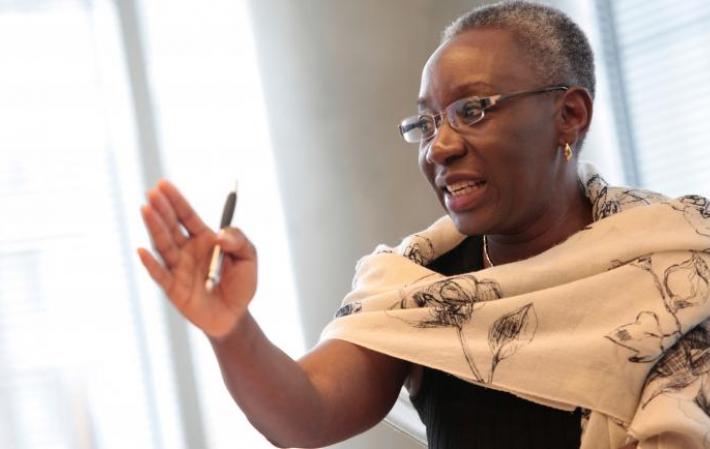
Sandra Pepera, Senior Associate and Director for NDI's Gender, Women and Democracy team.

Having just voted for the presidential elections in July 2014, voters in Jakarta’s Senin district show their inked fingers. Photo by Telibert Laoc
Sovereignty resides in and flows from the people of a country. They have a collective right to choose their governmental, political and electoral systems as an aspect of self-determination. The authority of government derives from the will of the people in their choice of these systems, and the people have a right to take part in their government – including through genuine elections to determine who is to legitimately occupy governmental offices.
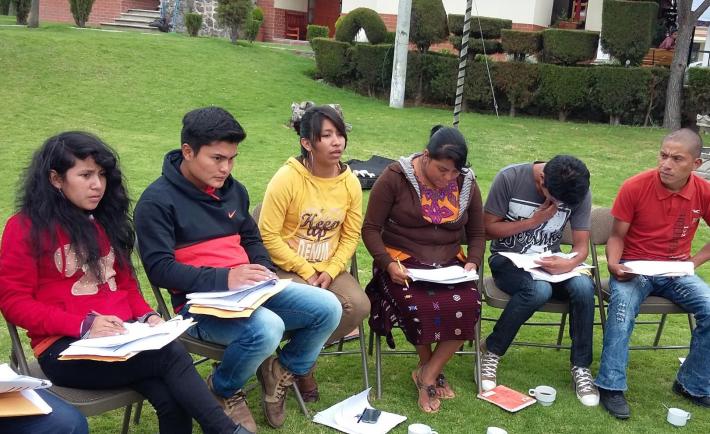
Milvia Roxana Lopez (third from left) speaks during a training for citizen election observers in Guatemala. “Self-confidence was key,” she said, referring to her ability to break through gender-based stereotypes as an election observer documenting incidents of violence and educating voters during last year’s historic elections.
At 25 years old, Milvia Roxana López, an indigenous woman, may be diminutive in size but she exudes a confidence that demands she be heard. As an observer who monitored electoral violence, Milvia met with leaders from her town and surrounding communities to document acts of electoral violence -- not an easy topic to broach in country that has one of the highest homicide rates in the world. “For me, self-confidence was key,” declared Milvia, referring to her role as an election observer. “To many people, it’s not the same when a woman says something as when a man says something. I don’t know where I got the strength, but I did it.”
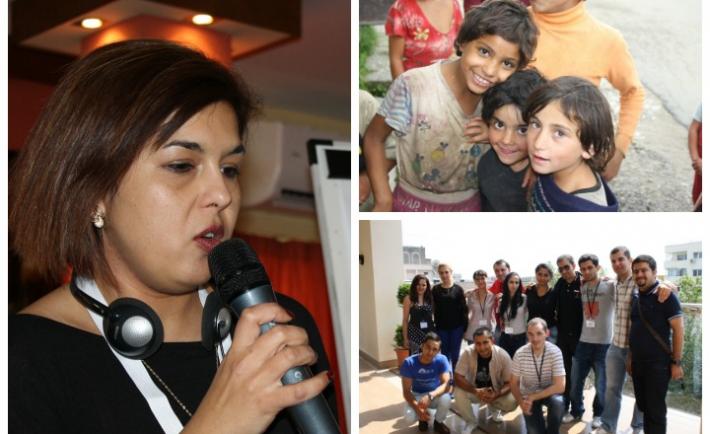
Left: a Slovak Roma activist at an NDI advocacy training. Top Right: Roma Children in a segregated Slovak settlement. Bottom Right: Youth activists at an NDI training on media and Information Communications Technologies (ICTs) in advocacy.
April 8 is a special day. It’s a day when more than 10 million Romani citizens worldwide celebrate their rich culture, traditions, and heritage. And this year, it marks exactly 45 years since the First World Romani Congress, which took place in Orpington, England. On April 8, 1971, 23 representatives of nine countries and numerous observers formed the International Roma Union - an organization to represent Roma policy and interests worldwide - and adopted an official Roma flag and the Roma anthem, Djelem, Djelem.
But who are the Roma?
Since the Guatemalan elections concluded in October 2015, NDI has held conversations with local partner organizations and election observers to better understand their experiences, as well as their hopes for their communities and the country. In order to highlight their voices, we will post a series of blogs documenting stories of inclusion and change -- the people behind the headlines working to build a strong democracy in Guatemala.
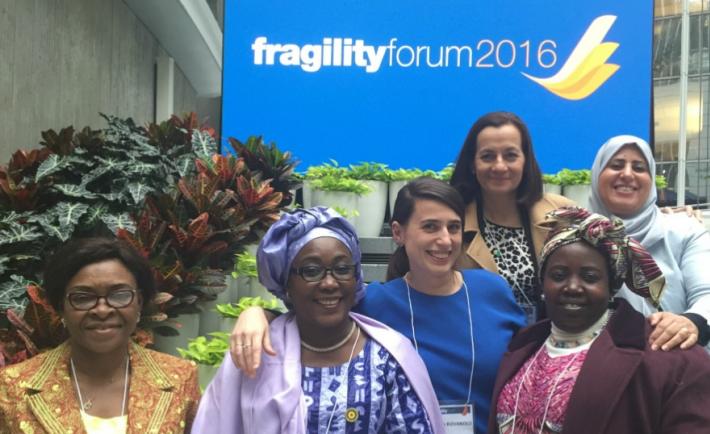
After the delegates' closing remarks at the 2016 Fragility Forum, from left to right: Stella Ngwu (Nigeria), Aissata Toure Diallo (Mali), Besa Rizvanolli (NDI), Clara Rojas (Colombia), Sabina Dario Lokolong (South Sudan), Dr. Sultana Mismari (Libya)
In fragile and violent places, whether it is Colombia, Libya, Mali, Nigeria, or South Sudan, the role of women during crisis, war, and post-conflict reconstruction has been critical. Conflicts often force women to get organized and to safeguard the basic necessities that bolster day-to-day life in each family. They also participate in fighting wars, and in rebuilding their communities. Women act as peacekeepers, relief workers, and mediators. Yet, when peace talks occur, women are not invited to the table and peace agreements are often drafted without the critical perspectives of women.
With this reality in mind, under USAID’s Global Women’s Leadership Program (GWLP), NDI brought a delegation of women members of parliament (MPs) to the World Bank Group Fragility Conflict and Violence Forum 2016 (also referred to as the Fragility Forum) in Washington, DC in early March.
%20(1).jpg)
Mona Lena Krook, #NotTheCost technical advisor, greets Dr. Ave Maria Semakafu (Sextortion Coalition, Tanzania) and Susana Villaran (Former Mayor of Lima, Peru, current vice presidential candidate). Photo credit: Nikhil Shah.
At 5:45 in the morning, there isn’t much that I think about apart from coffee. But at 5:45 AM on March 17th, 2016 in New York City, I - along with NDI colleagues from the Gender, Women & Democracy (GWD), Operations, Communications & Development teams - was getting ready to run lighting cues, set-up registration and prep our volunteers for the #NotTheCost launch event. But then March 17th happened, and after all the planning, after all the last-minute arrangements -- including exciting additions to the program such as women’s activist and wife of the Canadian Prime Minister Madame Sophie Grégoire Trudeau -- I finally got to see this thing come to life. I watched people I’d only ever read about discuss this topic. I heard Madeleine Albright speak, and I listened as women representing countries as diverse as Kosovo, Cote D’Ivoire, Indonesia and Peru shared profoundly personal stories of violence they had experienced as women because they dared to be political activists, elected officials or candidates. I walked away from the event completely floored by what what I had just witnessed.
Each week NDI’s Citizen Participation team provides a resource to assist NDI staff in meeting the objectives of their programs. This past month’s resources analyzed the process of building advocacy skills, the transformative potential of online videos for training, and a range of tactics and interventions that citizens and civil society can use to hold governments to account. These resources provide tools and insights that can help citizens strengthen their ability to effectively engage in political processes and bring about social and political change.
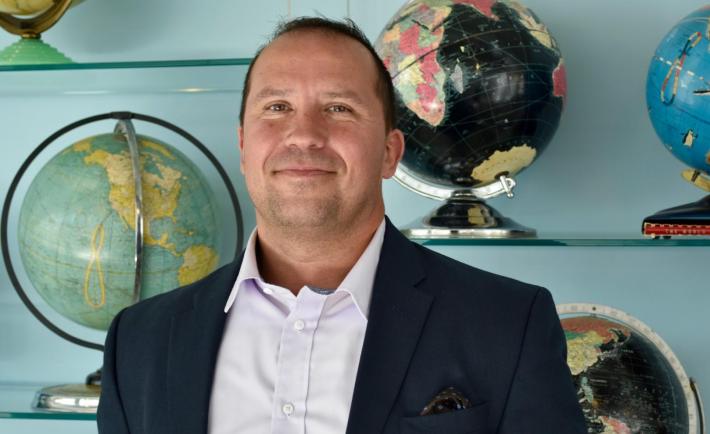
Fabricio Rodriguez is a veteran community organizer for employee rights, who began organizing 15 years ago while working at a sub-surface mine.
An important focus of our work here NDI for the past few years has been to find ways to help democracy deliver on the promise to improve the quality of life for people. In practical terms this has led some programs to grapple more explicitly with issues that address day to day concerns of people, such as education and healthcare. The way we see it, bringing about social change is inherently political, and the kind of skills and experiences that are imparted in an NDI program often lend themselves to these practicalities.
At a local Belgrade bar in September 2015, a group of assailants attacked a young LGBTI activist named Dragoslava Barzut while she was spending the evening with friends. No one stood up to protect Barzut and her friends that night. She continued to receive threats following the attack. Despite the attack and threats, asylum abroad was not an option for Barzut. She will not leave her country as long as she can be an agent for change even though she feels wary while on public transportation and nervous during her daily commute to work. “I'm not staying here because Serbia is an ideal place for someone like me to live,” she said, “but I deeply believe that if I don’t leave, one day it may be. My fight is here.”
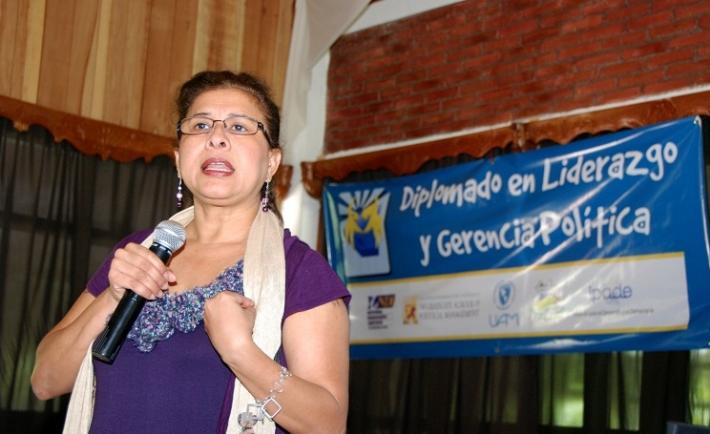
NDI's Nicaragua project is developing a community organizing component to complement youth leadership training through the Certificate in Leadership and Public Management.
More and more evidence suggests that politics matters for development, and that there is a need to do development differently by thinking and working politically. This refrain is intensifying and fueling efforts by donors, practitioners, and local partners to put this emerging approach into practice. But understanding the politics of change is only one part of the equation. Changing the politics is the other, more challenging part, especially when there are existing gaps in government transparency and accountability. Those of us working in the democracy and governance arena deal with this reality on a daily basis and have found some viable approaches when it comes to working politically.